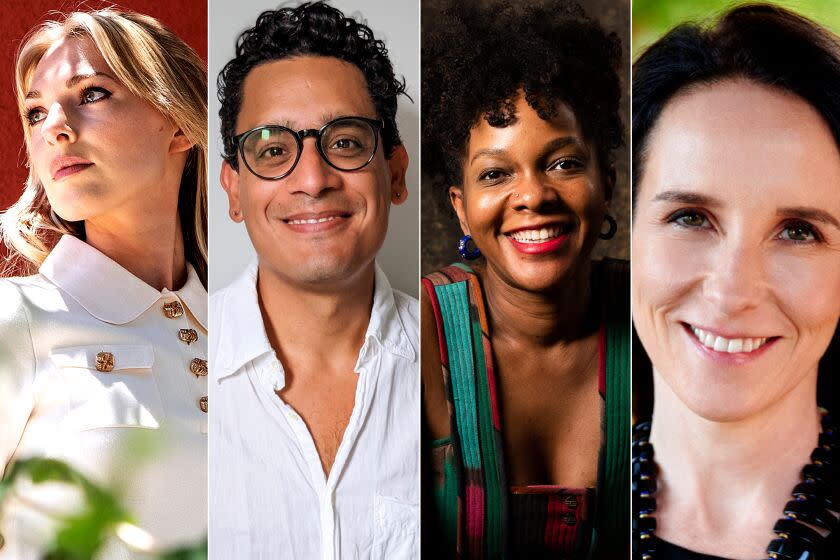Here are the finalists for the 2022 National Book Awards

- Oops!Something went wrong.Please try again later.
- Oops!Something went wrong.Please try again later.
- Oops!Something went wrong.Please try again later.
- Oops!Something went wrong.Please try again later.
Twenty-five titles have been shortlisted for the 2022 National Book Awards, the National Book Foundation announced Tuesday morning.
Selections culled from last month's longlist, which was heavy on debut authors, will compete across five genres: fiction, nonfiction, poetry, translated literature and young people's literature.
In the fiction category, Tess Gunty's debut novel, "The Rabbit Hutch," an epic revolving around a failed Indiana industrial town, is up against Jamil Jan Kochai's second book, the story collection “The Haunting of Hajji Hotak"; Gayl Jones' new novel, “The Birdcatcher," about Black American artists in Ibiza; Sarah Thankam Mathews’s debut novel, "All This Could be Different," about a young queer immigrant; and Alejandro Varela’s debut, "The Town of Babylon," about a gay Latinx professor’s conflicted return to suburban Long Island.
Books about science and race dominate the nonfiction shortlist. Meghan O’Rourke's "The Invisible Kingdom: Reimagining Chronic Illness" and David Quammen's "Breathless: The Scientific Race to Defeat a Deadly Virus" take on the flaws of Western medicine and the global response to the COVID-19 pandemic, respectively.
Princeton University professor Imani Perry's "South to America: A Journey Below the Mason-Dixon to Understand the Soul of a Nation" documents the racial legacy of the region; Robert Samuels and Toluse Olorunnipa bring deep historical and human context to their biography "His Name Is George Floyd: One Man's Life and the Struggle for Racial Justice." Ingrid Rojas Contreras' nominated memoir, "The Man Who Could Move Clouds," chronicles the exhumation of her grandfather, a shaman in Colombia.
Across the categories, five writers and one translator have been previously honored by the foundation, including 1998 fiction finalist Jones; 2019 translated-lit finalist Scholastique Mukasonga; 2002 poetry finalist Sharon Olds; 2018 nonfiction longlister David Quammen; and Yoko Tawada and Margaret Mitsutani, the writer-translator team who won for translated literature in 2018.
The winners, selected by independent panels of judges, will be announced Nov.16 at the 73rd National Book Awards ceremony. The event will take place in person for the first time since 2019 at Cipriani Wall Street in New York City. The ceremony will also be livestreamed.
The festivities will include the presentation of two lifetime achievement awards: Neil Gaiman will recognize Art Spiegelman with the Medal for Distinguished Contribution to American Letters and Tracie D. Hall will receive the Literarian Award for Outstanding Service to the American Literary Community.
Here's are this year's 25 finalists:
Fiction
Tess Gunty, "The Rabbit Hutch"
Gayl Jones, "The Birdcatcher"
Jamil Jan Kochai, "The Haunting of Hajji Hotak and Other Stories"
Sarah Thankam Mathews, "All This Could Be Different"
Alejandro Varela, "The Town of Babylon"
Nonfiction
Meghan O’Rourke, "The Invisible Kingdom: Reimagining Chronic Illness"
Imani Perry, "South to America: A Journey Below the Mason-Dixon to Understand the Soul of a Nation"
David Quammen, "Breathless: The Scientific Race to Defeat a Deadly Virus"
Ingrid Rojas Contreras, "The Man Who Could Move Clouds: A Memoir"
Robert Samuels and Toluse Olorunnipa, "His Name Is George Floyd: One Man's Life and the Struggle for Racial Justice"
Poetry
Allison Adelle Hedge Coke, "Look at This Blue"
John Keene, “Punks: New & Selected Poems"
Sharon Olds, "Balladz"
Roger Reeves, "Best Barbarian"
Jenny Xie, "The Rupture Tense"
Translated literature
Jon Fosse, "A New Name: Septology VI-VII." Translated from the Norwegian by Damion Searls
Scholastique Mukasonga, "Kibogo." Translated from the French by Mark Polizzotti
Mónica Ojeda, "Jawbone." Translated from the Spanish by Sarah Booker
Samanta Schweblin, "Seven Empty Houses." Translated from the Spanish by Megan McDowell
Yoko Tawada, "Scattered All Over the Earth." Translated from the Japanese by Margaret Mitsutani
Young people's literature
Kelly Barnhill, "The Ogress and the Orphans"
Sonora Reyes, The Lesbiana's Guide to Catholic School"
Tommie Smith, Derrick Barnes and Dawud Anyabwile, "Victory. Stand!: Raising My Fist for Justice"
Sabaa Tahir, "All My Rage"
Lisa Yee, "Maizy Chen’s Last Chance"
This story originally appeared in Los Angeles Times.

